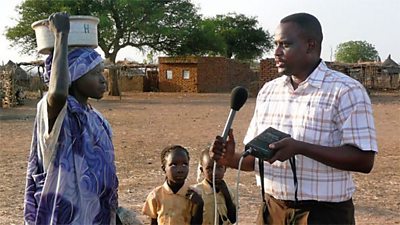Downloads
Midline research found that listeners of the radio programme Our School β which seeks to raise awareness of the benefits of education and tackle associated barriers β had more knowledge of South Sudanβs education system, had been more involved in education, and had budgeted for and discussed education with girls or daughters more than non-listeners.
Publication date: June 2017
Context
South Sudan, the newest country in the world, has some of the lowest educational indicators globally. Girls particularly struggle to achieve educational milestones, with very few of those who complete primary school continuing onto secondary education. In 2016, 128,000 girls started primary education, but only 2,700 completed secondary.
The project
The Girls Education South Sudan (GESS) project β funded by the UKβs Department for International Development β aims to change this, so that all girls can go to, stay in, and achieve at school. A consortium-based five-year-long initiative (2013-2018) of the Government of the Republic of South Sudan, GESS aims to transform the lives of a generation of children in the country β especially girls β through education.
Research approach
In mid-2016, ΒιΆΉΤΌΕΔ Media Action conducted a mixed-methods midline study to assess Our Schoolβs impact. This included a nationwide quantitative survey of 3,169 adults (aged 15 and above) from the former 10 states of South Sudan, and several pieces of qualitative research β focus group discussions with audiences, as well as interviews with participants of the community mobilisation activities. It conducted regression analysis to compare key outcomes (such as discussion of education issues) between those exposed and unexposed to Our School, while controlling for various factors β confounders β that might have affected the results (such as age or income).
Key findings
Strong reach
- Listenership of Our School increased from 0.9 million in 2014 to approximately 2 million in 2016. Of those, 80% listened to at least every other episode (i.e. regularly)
- This increase may have arisen due to an increase in the number of local languages used on and the broadcast partners airing Our School, the publicity drive undertaken, and/or more people having access to radio
Improving knowledge
- Listeners reported having gained knowledge from Our School, including knowing: how parents/communities can support girls (95%), why it is important for girls to stay in school (92%), how to register a child at school (90%), how girls receive cash transfers (89%), and how to budget for girlsβ education (88%)
- Regular, low-income listeners were, on average, 3.5 times more likely than non-listeners to have improved knowledge about South Sudanβs education system after controlling for confounders
Helping to budget for school fees
- Regular listeners were 1.4 times more likely than non-listeners to have saved money or sold something to help pay for uniforms or books. This is positive as Our School specifically sought to address the issue of better budgeting because school fees is still the most mentioned reason for boys and girls dropping out of school
- Nonetheless, 40% of midline respondents agreed with the statement βif there is a limited amount of money for education it should be spent on sons firstβ. This shows that, in practice, when money is limited, a boyβs education is prioritised by many
Increasing discussion of and participation in education-related activities
- Regular listeners were, on average, twice as likely as non-listeners to frequently discuss education with their daughters/girls
- They were also, on average, 1.6 more likely than non-listeners to have been highly involved with/participated in education
- Overall, the Our School audience was more likely to have actively participated in education-related activities than non-listeners: 48% of listeners had sought information or asked a question of a local school compared with 29% of non-listeners
More girls are going to school
- The South Sudan School Attendance Monitoring System shows that girlsβ enrolment has increased year-on-year since the start of the GESS project
- After controlling for other factors, ΒιΆΉΤΌΕΔ Media Actionβs midline analysis showed that regular Our School listeners with a daughter/girl were significantly more likely than non-listeners to say that their daughter/girl was in school
Implications
The midline showed that Our School listeners had better knowledge of the education system, were more involved with schools and engaged in more discussion with their daughters than non-listeners. This held true after controlling for confounders and thus suggests that the show is contributing to girlsβ education in South Sudan.
However, men continue to participate more than women and have higher levels of awareness around GESS initiatives (such as cash transfers and capitation grants that support girlsβ education). As such, Our School should continue to work to address the differences in levels of knowledge and practice between men and women.
Finally, Our School should continue to focus on addressing increases in ethnic tensions and the impact of the conflict in its content.
